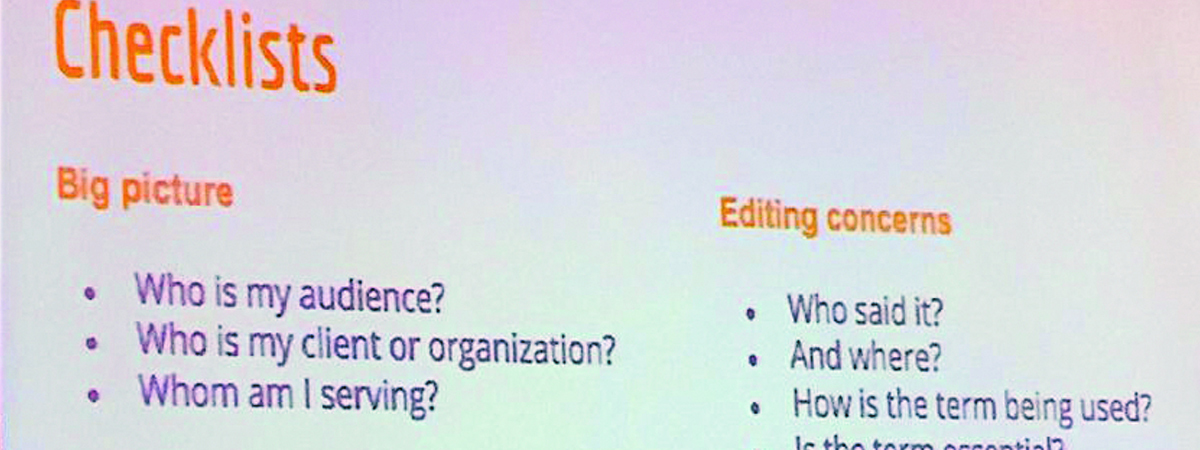
A few days ago, I received junk mail from a major company that was having a sale on nutritional supplements. The top of the ad said something along the lines of “Get your beach body now. Get a suntan this summer.” My skin is brown (naturally), and I live in a large city that is 56 percent not white. The ad seemed to reflect an underlying assumption that the default person is white — a bias that is increasingly problematic, and not exactly a winning business strategy, in a country that is only growing increasingly more diverse.
Bias in language can be right in front of us, but if we don’t have our antennas up and we aren’t on the lookout, we might not notice it. The speakers at March 23’s ACES panel “Is This Racist?” provided helpful tips and reminders about how to be attuned to problematic language.
Steve Bien-Aimé, a journalism professor at Louisiana State University, opened the panel by distinguishing between political correctness and inclusivity. Political correctness, he said, is “doing something because ‘you don’t want to get in trouble.’” Inclusivity is about “creating an environment where everyone feels welcome.”
He asked us to stop and think about the following things:
“If it’s not like me,” then is it exotic? Calling something “exotic” is often a way of unnecessarily “othering.”
Why do we talk about “Asian food,” but not so much “European food”?
Who are in communities? Why do we say there’s a “black community” but not a “white community”? A “Muslim community,” but not a “Christian community”?
Bien-Aimé contrasted the Virginia Tech shooting (perpetrated by a young man born in South Korea who had moved to the United States as a child) and the Aurora, Colorado, theater shooting (perpetrated by a young, white U.S.-born man). He pointed out how one publication went to Koreatown in Los Angeles to get reactions from Korean Americans about the Virginia Tech shooter. But did any publication go to white people more than 1,000 miles from Colorado to ask, “How do you feel, as a white person?”
He also explained that using hypercharged language — such as calling people “illegals” — doesn’t create space for civic debate. Instead, it creates antagonism.
Karen Yin, creator of Conscious Style Guide, discussed unconscious bias and reminded us that such biases “don’t necessarily align with our declared beliefs” and “can be held against the groups we belong to.”
Unconscious bias can happen at several levels. At the word level, it can happen when we lack parity in parallel contexts. Compare the following two headlines from San Jose’s Mercury News:
Original headline:
“Olympics: Michael Phelps shares historic night with African-American”
Revised headline:
“Olympics: Stanford’s Simone Manuel and Michael Phelps make history”
Or consider the assumptions you might have recently made about the woman appearing in the video of the professor who was interrupted by his children during his BBC interview. If you assumed the professor’s wife was his children’s nanny, why did you do so? What sort of unconscious assumptions were you making?
And be careful not to interchange people! Yin provided several examples of when people of the same race where confused with one another. One publication confused Kal Penn and Dev Patel. Both actors are of Indian heritage, but they’re different people who look different. (Similarly, a winner of ACES’s Robinson Prize, Doris Truong, was recently — and falsely — accused of being the woman who allegedly took photos of Rex Tillerson’s notes during his Senate confirmation hearing to be secretary of state. In this case of mistaken identity, both women were the same race, but they certainly weren’t the same person!)
Another thing to watch out for is crediting the dominant members of a group with being the group itself. For example, Yin pointed out, the 19th Amendment didn’t give American women the right to vote. It gave white American women the right to vote. Similarly, when people use the term “Asian American,” they’re often describing Americans who trace their ancestry to China, Japan, and South Korea, but the term also includes people whose heritage goes back to South Asia (India or Sri Lanka, for example) or Southeast Asia (the Philippines or Vietnam, for instance).
Rick Kenney, chair of the Department of Communications at Georgia’s Augusta University, spoke about verbal redlining — when we use a term like “South Central LA” as a racialized code name for a place we’re “trying to warn people” about.
He also brought up headlines that play on derogatory stereotypes. For example, consider the headline “Inspectors Find Dogs in San Antonio Chinese Restaurant” — about a restaurant that had dogs, possibly pets, roaming in it. The headline reinforced the negative stereotype that Chinese people are dog-eating weirdos.
Henry Fuhrmann, formerly of the Los Angeles Times, discussed the topic of “who’s deciding” and the dangers of assuming “others will stop it.” He described an instance when objectionable wording made it into the paper. The copy editors had assumed that the editor had OK’d the wording. The editor had assumed that the copy editors would stop the wording from getting into the paper if it didn’t meet standards. And the writer, looking for edgy wording, assumed that “others will stop me” if the wording went too far.
I don’t know the thinking that went into the “Get a suntan this summer” ad — I don’t want to assume too much without knowing the full story — but I wonder whether anyone ever spoke up about the assumption underlying the ad. Copy editors in particular should always be questioning and looking for what could be wrong in any way — and that includes biased and less-than-inclusive language.
(Preeti Aroon is a copy editor for National Geographic and formerly copyedited at Foreign Policy. Comma splices and lowercasing “Is” in headlines really annoy her. Please follow her on Twitter: @pjaroonfp.)